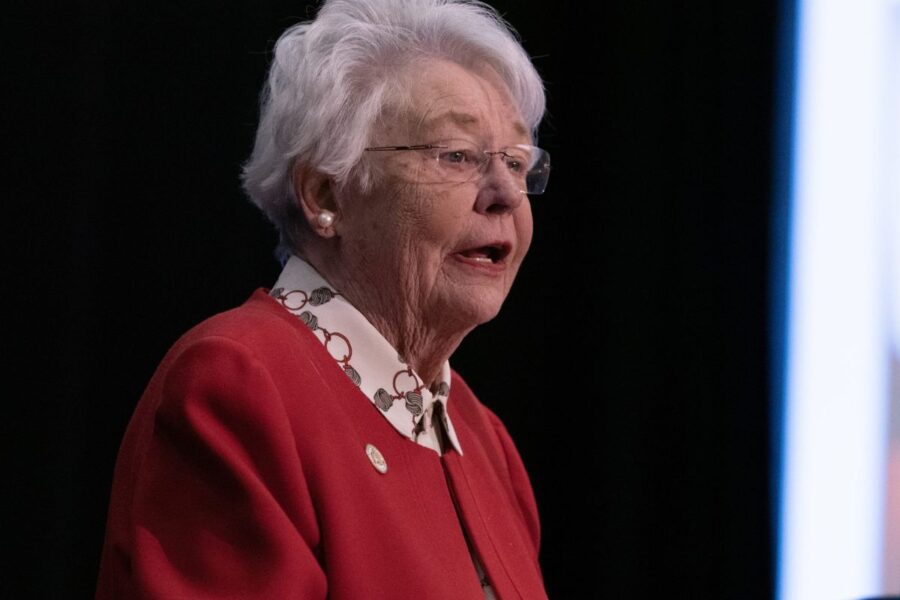Ivey Launches Task Force AI Research: Governor Ivey’s recent announcement of the formation of a task force dedicated to AI research and regulation marks a pivotal moment in Alabama’s technological landscape.
As the GenAI Task Force gears up to address the complexities of governing artificial intelligence, stakeholders across various sectors eagerly anticipate the potential implications on industry standards, privacy regulations, and economic development.
With the mandate set and the wheels in motion, the spotlight now shifts to how this initiative will shape the future of AI governance not only in Alabama but potentially on a broader scale.
Key Takeaways
- Alabama’s proactive AI task force focuses on GenAI governance.
- Diverse task force composition ensures comprehensive policy recommendations.
- Lawmakers contribute varied expertise for responsible AI regulations.
- Governor Ivey’s vision emphasizes ethical AI implementation and transparency.
Alabama Takes Lead in AI Governance: Gov. Ivey Forms Task Force
Governor Kay Ivey’s proactive decision to establish a task force in Alabama marks a significant step towards pioneering AI governance in the state, focusing specifically on the utilization of Generative Artificial Intelligence (GenAI). By signing an executive order to create this task force, Governor Ivey is demonstrating a forward-thinking approach to technology regulation.
This move not only showcases Alabama’s commitment to staying at the forefront of technological advancements but also highlights the state’s recognition of the importance of proper governance in the AI sector.
Alabama’s initiative to study and make policy recommendations on GenAI sets a notable precedent in the realm of AI regulation. With a history of technological innovation, the state is well-positioned to lead the way in developing frameworks for the responsible and ethical use of AI technologies.
Governor Ivey’s emphasis on GenAI specifically indicates a strategic focus on understanding and addressing the unique challenges and opportunities presented by this advanced form of artificial intelligence. This task force’s establishment underscores Alabama’s proactive stance towards shaping the future of AI governance.
GenAI Task Force Composition and Mandate
Alabama’s proactive stance towards shaping the future of AI governance is exemplified through the composed 13-member task force, appointed by Governor Ivey, which is tasked with studying GenAI’s current applications in executive branch agencies, assessing associated risks, and providing policy recommendations to state lawmakers by November 30.
The task force includes a diverse range of expertise, with members drawn from cabinet positions, higher education institutions, state senators, and representatives. This varied composition ensures a comprehensive examination of GenAI’s implications and a well-rounded set of perspectives when formulating recommendations for future policies.
GenAI Task Force Composition:
| Role | Member |
|---|---|
| Cabinet Member | John Smith |
| Higher Education Rep | Dr. Jane Doe |
| State Senator | Senator Michael Brown |
| State Representative | Representative Sarah Lee |
With this blend of experience and knowledge, the task force is well-equipped to navigate the complexities of GenAI regulation and offer informed guidance to state lawmakers. Their collective efforts are crucial in establishing a robust framework for the responsible integration of AI technologies within the state of Alabama.
Lawmakers’ Perspectives on GenAI Regulation
Lawmakers tasked with examining GenAI regulation bring a diverse range of perspectives and expertise to the discussion, reflecting a commitment to informed decision-making in shaping policies for the responsible integration of AI technologies. Senators Sam Givhan and Bobby Singleton, along with Representatives Mike Shaw and Kelvin Lawrence, have been appointed to the task force. Shaw, who boasts nearly 30 years of experience in the technology field, expresses honor and excitement about contributing to this crucial effort. His previous intent to introduce a bill regulating GenAI deepfakes aligns closely with the forward-thinking approach advocated by the governor.
The inclusion of individuals with backgrounds in technology, law, and public policy underscores the multifaceted nature of the regulatory challenges posed by GenAI. This diversity of perspectives will likely lead to comprehensive discussions and well-rounded policy recommendations. As these lawmakers convene to deliberate on GenAI regulation, their varying viewpoints will be instrumental in crafting a regulatory framework that balances innovation with ethical considerations, ensuring the responsible deployment of AI technologies in the state.

ALSO READ: Alabama Strategic Rail Evolution: Decatur Facility Unveiled by Port Authority and CSX
Governor Ivey’s Vision for Responsible AI Implementation
With a keen focus on technological advancement and ethical considerations, the discussion surrounding responsible AI implementation in Alabama is guided by Governor Ivey’s visionary outlook. Governor Ivey’s vision for responsible AI implementation is rooted in strategic planning and foresight, aiming to harness the full potential of AI while safeguarding against unintended consequences.
Here are four key elements that encapsulate Governor Ivey’s approach:
- Ethical Framework: Governor Ivey emphasizes the necessity of establishing a robust ethical framework to govern AI applications, ensuring adherence to moral principles and values.
- Stakeholder Engagement: She advocates for active engagement with various stakeholders, including experts, policymakers, and the public, to gather diverse perspectives and foster collaboration.
- Transparency: Governor Ivey underscores the importance of transparency in AI systems to build trust and accountability among users and the broader community.
- Continuous Evaluation: She highlights the need for ongoing evaluation and monitoring of AI technologies to identify potential risks and make timely adjustments to ensure responsible deployment.
Executive Order Sets Stage for GenAI Pilot Programs
Governor Ivey’s strategic initiatives in responsible AI implementation have taken a tangible step forward with the recent executive order paving the way for GenAI pilot programs under the Alabama Office of Information Technology’s guidance.
This executive order directs the Alabama Office of Information Technology to establish infrastructure for state agencies to conduct GenAI pilot programs in a controlled setting. By proactively creating this framework, Governor Ivey showcases a commitment to staying ahead of technological advancements and ensuring that GenAI is introduced with thoughtful analysis and regulation.
| GenAI Pilot Programs | ||
|---|---|---|
| 1. Controlled Setting | 2. Infrastructure Establishment | 3. State Agency Focus |
| 4. Guidance by AOIT | 5. Governor Ivey’s Vision |
The table above summarizes the key points surrounding the executive order and the establishment of GenAI pilot programs. With a focus on controlled environments and guidance from the Alabama Office of Information Technology, these programs aim to facilitate responsible and regulated integration of GenAI technologies within the state.
Conclusion Of Ivey Launches Task Force AI Research
The formation of the Gen AI Task Force in Alabama under Governor Ivey’s leadership marks a significant step towards regulating and implementing AI technology responsibly.
The task force’s composition and mandate, along with lawmakers’ perspectives on AI regulation, indicate a concerted effort to address the challenges and opportunities presented by artificial intelligence.
Governor Ivey’s vision for AI governance sets the stage for pilot programs that will shape the future of AI research and regulation in the state.

